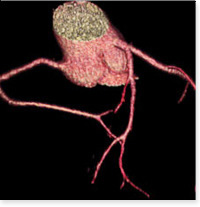Cardiac Calcium Scoring

- Benefits of Cardiac Calcium Scoring
- Clinical Overview
- The Technology
- The Calcium Score
- Frequently Asked Questions
- Patient Preparation
- Office Locations
Cardiac Calcium Scoring
Benefits of Cardiac Calcium Scoring
This non-invasive, pain-free test measures the amount of calcified plaque in the coronary arteries. Calcified plaque represents coronary artery disease. A high amount of plaque indicates an increased chance of heart attack.
With this information, you and your doctor will have a better idea if Calcium Scoring would help you better manage your health.
Clinical Overview
Atherosclerosis is the sole cause of calcium deposition in the coronary arteries. CT is able to accurately detect and quantify these calcium deposits. Therefore, a CT generated "coronary artery calcium score" provides a quantitative measurement of a patient's coronary artery atherosclerosis. The calcium score has been shown to be a predictor for future coronary events. It should be noted that calcium scoring is not a coronary angiogram and does not characterize individual atherosclerotic plaques, nor does it quantify the degree of a focal stenosis.
The Technology
University Radiology uses the latest 64 slice helical CT technology to measure the coronary calcium score. The speed of these high-tech scanners allows cardiac motion to be frozen producing precise measurement of coronary artery calcium.
The Calcium Score
The calcium score is a number that quantifies the overall size and density of calcification in all of the coronary arteries and main branches. The magnitude of the calcium score is used to assign a qualitative interpretation. 1 See chart below.
In addition to the overall calcium score, the score is broken down into its anatomic distribution among the left main, left anterior descending and branches, circumflex artery, right coronary artery and posterior descending artery.
1 Rumberger JA, Brundage BH, Rader DJ, Kondos G. Mayo Clin Proc 1999; 74:243-252
Frequently Asked Questions About Cardiac Calcium Scoring
How does this test help patients?
Coronary calcium scoring has been shown to correlate with future
coronary events and helps stratify a patient’s risk. Specifically, a
negative test confers a low risk of future events, while a
significantly elevated score (>400) has been shown to correlate with
obstructive atherosclerosis. Of course, risk stratification is based on
statistics and occasionally a patient with a negative test can have
obstructive coronary disease.
What does a positive (non-zero) score mean?
That atherosclerosis is present. Atherosclerosis is the sole cause of
calcium deposits in the coronary arteries. This direct demonstration of
atherosclerosis may provide the motivation some patients need to make
lifestyle modifications to lower risk.
Is this test for symptomatic patients?
No. While studies have shown that coronary calcium scoring may help to
risk stratify symptomatic (i.e. chest pain) patients, coronary calcium
scoring does not replace the conventional work-up because a false
negative exam would lead to missing obstructive disease.
Who should get this test?
Asymptomatic patients in whom the physician wishes to more fully assess
their future risk of coronary events. The results of this test should
be interpreted in conjunction with an assessment of other cardiac risk
factors such as age, gender, hypertension, smoking, family history,
etc.
- Pregnancy
- Pacemakers
- Orthopedic hardware in the mid or lower thoracic spine
Patient Preparation
- Cardiac Scoring: Information and Preparation
- No tobacco, coffee, caffeinated soda, or chocolate for 6 hours prior to the test.
- No vigorous exercise for 24 hours prior to the test.
- No gum chewing on the day of the test.
- Eat and take medications as normal.
University Radiology Imaging Centers Offering Cardiac Calcium Scoring
- Benefits of Cardiac Calcium Scoring
- Clinical Overview
- The Technology
- The Calcium Score
- Frequently Asked Questions
- Patient Preparation
- Office Locations
